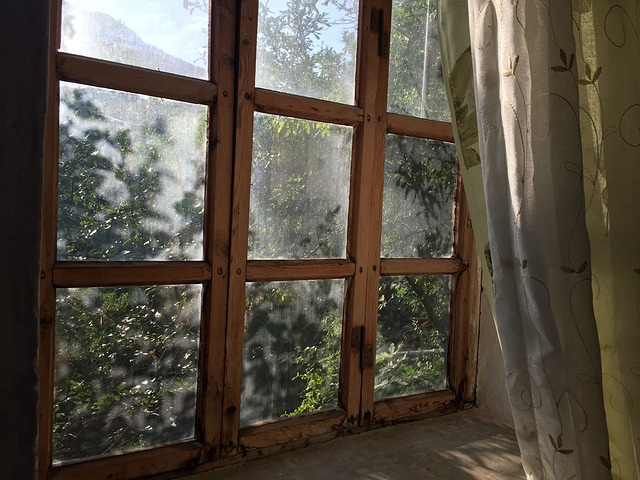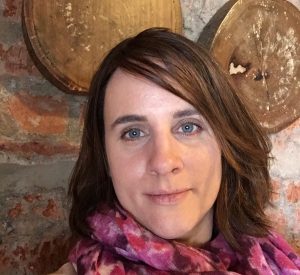I am alone with my two-month-old baby all day long, trapped in a flat patio home in a flat little town in northeast Ohio without a car. I am not a good driver and not a patient line-waiter at the DMV, so I haven’t bothered yet to untrap myself. My husband, Jason, teaches at Oberlin during the day, lecturing on disability representation in horror films. He teaches theatre history, too. His students lie to get out of midterms.
Baby and I are happy together. We take warm baths, naked and content, and she leans against me, mimicking her womb-home. I like to think she remembers it. She spends her mornings in a bouncer and a swing, thrilled by her own face in a flower-shaped mirror and by a little stuffed trio of bear-faces, making sounds that I convince myself mean Mama and Hello and When I Grow Up, People Will Believe Me. I throw her little arms over my shoulder and she rests them there, happy, straining her neck muscles to watch the shadows play on the walls. I think of my dreams for her, lofty ones: she who will never be called hysterical; she who will be loved by a bespectacled someone with a frightening ferocity; she who will sleep soundly, think slowly, speak loudly the first time.
When she naps, I write. I write my PhD dissertation in short, fevered clumps. I write boring articles about standardized tests and sets of concerning health symptoms for money. I read blogs about mermaids and kink and doll collections; I read The Godfather again. I read Streetcar for the tenth, the hundredth, time, and think about how I would have married Stanley and stayed with him, no question, absolutely. (This is my Achilles heel, my tragic flaw were I in every other way a hero). I write annotations and revise essays for my MFA manuscript, always embarrassed. I write long, passionate recaps of trashy reality television shows on a forum under an alias I will never share, and argue with strangers about which of the MTV teen moms is the worst. I write elaborate, angry emails to relatives that I don’t send. I write elaborate, angry emails to the midwives at my hospital; I send all of those. I write carefully worded emails to Jason, in short paragraphs like he likes, and I send a few. I make up hypothetical scenarios in which he might discover he doesn’t love me, on a spectrum of definitely-not-my-fault (psychotic break? Disfigurement in a car wreck? Medication regimen that makes me gain 400 pounds?) to definitely-my-fault (felony theft, conversion to Mormonism) and ask him what his response would be. I know this is insufferable; I probably enjoy the absurdity. I write back to strangers in my Facebook inbox (“thanks for your interest, but I’m happily married”) and ignore my friends until they tell me I’m being rude; I probably enjoy the shame.
I drink three cups of coffee every morning, cream and sugar, making up for lost time. Sometimes I drink a fourth one during her second nap, at noon. I don’t eat breakfast. For lunch, I eat hunks of cheddar cheese, a few grapes, a grasp of bread. I leave the crumbs and the mugs until, around four-fifteen, I look around, a bit surprised that no one’s come to clean it all up. I do it myself before he gets home at five, even though he wouldn’t care if it was messy. At night, I have wine, great sticky purple gulps of the cheap stuff, for the first time in nine months. I consider weed, but don’t use it for the sake of progress. I plan to exercise, but I don’t. Sometimes we go out, when family is visiting and they babysit, and stare at each other, dazed, over our Moscow mules, thinking, “Who are you? How do we love each other as parents?” We ask each other how we feel—“How are you?” “How are you feeling?” “You OK?”—again and again, strained voices pressing into each other in the dark (you ok? you ok? you ok?), trying to make it all make sense, take shape. He takes care of her at night while I sleep, slumped against him, until he presses her against my breast to suckle. Is this happiness?
Every day, I wonder when she will learn that her mother is Sad, capital-s Sad.
I realize that I have to tell her the truth about me, eventually. I will start, I think, with an apology: “Mommy is sorry that she is sad.” I won’t be sad right then, but I know I will be, over and over again. She will learn what sadness is through me, no matter how I try to hide it.
I am aware that this is how monsters get made, this is how horror films begin, a woman trapped in a purple bathrobe in a patio home in Ohio, always a little disappointed, waiting for magic that never comes. She wonders if she should create the magic herself, if a spell would do the trick. She is too tired to look up any more spells, and, weary of the yearning, afraid of longing for things that will never come, she [goes crazy/opens the oven door and doesn’t shut it/starts an Etsy account/screws a neighbor] instead. But I have tried every escape, hacked open every latch with a pickax, and still the yearning catches my throat in the night. And if yearning is religion (fervent, unyielding), I will live monastically rather than monstrously. There’s only a fine line between them.
(This piece first appeared on P.S. I Love You.)
 Laura Dorwart is a Ph.D. candidate at UCSD with an MFA in creative nonfiction. She has published work at Catapult, The New York Times, McSweeney’s, Bitch, and many others. Follow her work at lauramdorwart.com or twitter.com/lauramdorwart.
Laura Dorwart is a Ph.D. candidate at UCSD with an MFA in creative nonfiction. She has published work at Catapult, The New York Times, McSweeney’s, Bitch, and many others. Follow her work at lauramdorwart.com or twitter.com/lauramdorwart.


 Amy Karon’s credits include Eastern Iowa Review, Inking the Unthinkable: Poems About Poetry (Lagan Online), Cricket, Mystic Blue Review, Iowa Heritage Illustrated, and Eternal Haunted Summer. She lived for years in the American Southwest and now divides her time between India and California.
Amy Karon’s credits include Eastern Iowa Review, Inking the Unthinkable: Poems About Poetry (Lagan Online), Cricket, Mystic Blue Review, Iowa Heritage Illustrated, and Eternal Haunted Summer. She lived for years in the American Southwest and now divides her time between India and California.